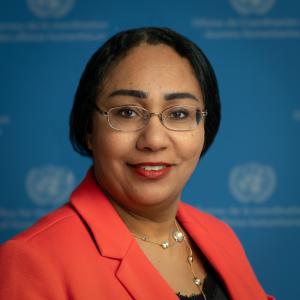Dr. Wajdan Al-Aqab, Chairperson of the Board of Directors, Kuwait Environment Protection Society
Mr. Ahmed Jaber Al-Eidan, CEO of Kuwait Oil Company
Excellency Mr. Emil Karimov, the Ambassador of Azerbaijan to Kuwait
Representatives from the Ministry of Defense, Kuwait Society for Crisis and Emergency Management
Regional representatives from the League of Arab States, the Arab Network for Environment and Development and the Arab Group for the Protection of Nature
Excellencies, esteemed guests, ladies and gentlemen,
Good morning to you all. First, I would like to extend my sincere thanks for inviting us to this meaningful event marking the ‘International Day for Preventing the Exploitation of Environment in War and Armed Conflict’. I would also like to express my deepest gratitude to the Kuwait Environment Protection Society and Kuwait Oil Company for organizing this event. It is an honor for me to stand here and commend environmental heroes in the context of war and armed conflict, and to support their remarkable journey on behalf of the United Nations in Kuwait.
23 years ago, the State of Kuwait submitted a resolution to designate November 6 of each year as the ‘International Day for Preventing the Exploitation of the Environment in War and Armed Conflict’. Since then, this day has become a great opportunity for people worldwide to reflect on the devastating impact of wars and armed conflicts on the environment, and consequently, on humanity.
The deliberate and irresponsible destruction of the environment through projectiles, bombs and weapons in the context of violent human conflicts is catastrophic. These actions undoubtedly have a long-lasting impact, not only on our current lives but also extending the effect onto future generations. Armed conflicts lead to the destruction of nature and the ecosystem, pollution of water, air and soil, threaten food security and exacerbate climate change. Since the environment is a silent victim of human conflict, it is particularly crucial for us to become spokespersons for our own habitats to raise awareness and to continuously exert practical efforts for the planet on which we live on.
Honored guests,
Only three decades ago, Kuwait directly experienced the catastrophic effects of the war on its national environment, and the extent of this impact both physically and emotionally. Kuwait made great efforts to recover through collective action, with firefighters from all institutions of the State of Kuwait demonstrating true heroism in extinguishing the oil fires following the liberation of Kuwait.
Through this difficult experience, Kuwait has become an influential voice, leading the way and establishing its global presence as an international leader in protecting the environment from the impact of wars and armed conflicts. In this regard, the UN is proud to stand alongside the people, communities and the government of Kuwait in advancing this agenda.
Ladies and gentlemen,
Preservation of environment in wars and armed conflicts is a key priority of the UN globally and particularly in Kuwait where our focus is on the environment, peace and security, all of which are essential to achieving the Sustainable Development Goals (SDGs) and Kuwait Vision 2035. The world has witnessed and experienced the long-term destructive effects of nuclear, biological, and chemical weapons, and their devastating impact on humans, crops, and nature. We have all seen how green areas and once vibrant cities have turned into devastation and desolation due to the irresponsible use of these internationally banned weapons. I have personally seen child victims who lost their lives or limbs, and those who survived were left with permanent disabilities due to the remnants of war, such as mines and unexploded ordnance. I have seen entire areas deemed uninhabitable or inaccessible due to the absence of landmine maps, making clearing and restoring of life to these areas a difficult, arduous, costly and a time-consuming process.
We must urgently address the environmental damage caused by conflicts and their remnants, so that our children and grandchildren can grow and thrive in a peaceful world.
Through today’s memorable event, we send out an important message to the region and the world: we must not neglect the land beneath our feet, but take necessary actions to restore and rebalance it before the environmental destruction caused by conflicts becomes irreversible. As the environment, peace and security are deeply interconnected, they require multidisciplinary efforts from everyone across all sectors. I hope that today’s dialogue will result in an expanded network of ideas and inspirations, which would lead to concrete, joint efforts in the near future.
In this regard, I cannot miss quoting the UN Secretary General António Guterres, who said, “If we are to achieve the SDGs, we need to act boldly and urgently to reduce the risks that environmental degradation and climate change present for conflict and commit to protecting our planet from the debilitating effects of war.”
As we reaffirm our commitment at the United Nations in the State of Kuwait, we continue to strive for strong partnerships with state institutions and active entities, including associations, organizations, and communities dedicated to preserving the environment and preventing its exploitation in wars and armed conflicts.
In conclusion, I thank you for your integral and inspiring efforts, and we wish you all success and prosperity.









